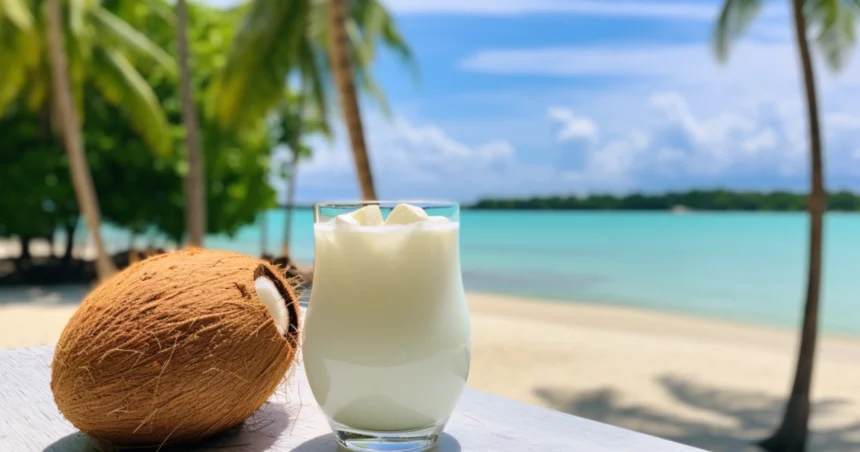Coconut water has become a go-to hydration hack for many health-conscious folks. This tropical elixir provides a tasty, low-calorie alternative to sugary sports drinks. Beyond basic hydration, the clear liquid inside coconuts offers a variety of potential perks.
From replenishing electrolytes after a workout to aiding digestion, coconut water’s nutritional profile makes it a wise choice for overall wellness. Let’s explore some of the top ways this natural beverage may enhance health and vitality.
Nutritional Powerhouse
Coconut water isn’t just thirst-quenching, it’s a nutritional goldmine! Think of it as nature’s own sports drink, filled with a variety of essential minerals and nutrients. This clear, slightly sweet liquid extracted from young, green coconuts is particularly rich in potassium, calcium, and magnesium.
Why does this matter? Well, these three nutrients are often missing in many diets. Potassium, for instance, helps maintain a healthy heartbeat and nerve functions, while calcium strengthens bones and teeth. Magnesium? It’s involved in over 300 bodily functions, including muscle and nerve function, blood glucose control, and blood pressure regulation.
In fact, a single serving of coconut water can deliver more potassium than a banana and around 15% of your daily requirement for magnesium. So, next time you’re feeling a little drained, reach for a glass of coconut water. It’s like a vitamin and mineral supplement, straight from Mother Nature!
Superior Hydration
Let’s talk hydration. Not just any hydration, but superior, optimized hydration. That’s what coconut water brings to the table. When you sweat, you lose more than just water. You also lose essential electrolytes like potassium, sodium, and magnesium. These electrolytes are crucial for a range of bodily functions, including muscle contraction and energy generation.
Enter coconut water, the perfect natural rehydration solution. It’s not just about the water content; it’s the electrolytes that make it a hydration hero. It’s packed with potassium, has a good amount of sodium, and brings in a dose of magnesium too. These electrolytes help replenish what you lose during intense physical activity.
Promoting Blood Sugar Control
If you’re keen on managing your blood sugar levels, coconut water might just be your new best friend. Research suggests that it can potentially help lower blood sugar levels. How so? Well, it’s all about the magnesium.
Magnesium is a key player in insulin sensitivity. In other words, it can help your body use insulin more effectively, which in turn can help control blood sugar levels. And guess what? Coconut water is a good source of this important mineral.
Keep in mind, while coconut water can help, it shouldn’t replace any treatment or dietary plan your healthcare professional has prescribed. It’s always best to consult with them before making any major dietary changes.
Boosting Heart Health
Heart health is no joke, and coconut water is here to lend a hand. This tropical drink is low in calories, virtually fat-free, and doesn’t contain cholesterol. These qualities alone make it a heart-friendly choice. But coconut water doesn’t stop there.
Some studies suggest that it may help moderate blood pressure levels, thanks to its potassium content. Potassium is known to counteract the effects of sodium and thus help regulate blood pressure. In addition, the magnesium in coconut water can aid in preventing heart disease.
Moreover, coconut water’s potassium and magnesium content can potentially reduce the risk of stroke. They work together to keep blood vessels healthy and blood pressure in check.
While it’s no magic bullet, incorporating coconut water into a balanced diet and lifestyle can certainly be a step in the right direction for heart health. And as always, always consult with your healthcare professional for personalized advice.
Aiding Digestion and Weight Management
Did you know coconut water can also support your digestive health and aid in weight management? It’s true! This natural beverage is loaded with bioactive enzymes that can help with digestion and metabolism. Plus, it’s a good source of dietary fiber, which can aid in maintaining a healthy digestive system.
And let’s not forget the crucial role of calcium and magnesium. Both minerals are involved in numerous bodily processes, including digestion and cognitive functions. In fact, magnesium can even contribute to joint health, potentially helping to alleviate joint pain.
As for weight management, coconut water is a low-calorie drink, making it a smart choice for those watching their weight. It can satisfy your sweet tooth without the extra calories found in many other beverages.
Supporting Kidney Health
Now let’s turn our attention to the kidneys, those incredible organs that filter waste from our blood. They could use a little coconut water love, too!
Research suggests that coconut water might be beneficial in preventing kidney stones. It’s believed that the potassium found in coconut water can help prevent the formation of kidney stones by binding with calcium in the urine, reducing crystal growth.
Moreover, the hydration that coconut water provides can support overall kidney function. Adequate hydration is essential for healthy kidney function, and the additional electrolytes in coconut water might give your kidneys an extra helping hand.
Enhancing Skin Health
While research is limited, some evidence suggests coconut water may benefit skin health when applied topically. One study found that coconut water exhibits antibacterial properties that inhibited the growth of acne-causing bacteria. Other studies note coconut water’s hydrating effects when used in skincare products. The antioxidants and vitamins it contains may lend protective effects as well. More research is still needed, but initial findings indicate coconut water’s potential as a natural way to nourish skin.
Final Thoughts
When it comes to nourishing hydration, coconut water provides an array of health perks. From replenishing electrolytes to supporting digestion, this tropical sip enhances wellness in numerous ways. However, it’s important to keep in mind that coconut water still contains natural sugars. Those with diabetes or prediabetes should be mindful of portion sizes and monitor blood sugar levels.
Additionally, some medications may interact with high levels of potassium. As with any significant dietary change, chatting with your healthcare practitioner is advised to see if coconut water fits your individual needs. Overall, enjoying this refreshing drink in moderation can be a simple way to hydrate while giving your body a natural health boost.









